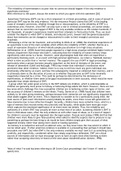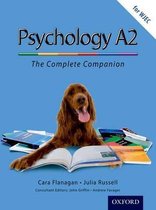‘The reliability of eyewitnesses is so poor that no conviction should happen if the only evidence is
eyewitness testimony’
With reference to the quote, discuss the extent to which you agree with this statement [20]
Eyewitness Testimony (EWT) can be a vital component in criminal proceedings, and in cases of assault in
particular EWT may be the only evidence. Yet the Innocence Project claims that EWT is the leading
cause of wrongful convictions, whether through lies or misconceptions, so the reliability of EWT is a
contentious area. However, since EWT can play such a role in criminal proceedings, we cannot simply
declare that no conviction can happen if EWT is the only available evidence as this renders hundreds, if
not thousands, of people’s experiences invalid and their attempts to find justice futile. Thus, we must
consider the degree to which EWT is reliable, and educate jurors, lawyers and the general population
about how memories can be changed or misconceived in order to limit wrongful convictions and
acquittals.
Witnessing a crime can be traumatic, and according to Wells et al. (2006) the emotional experience of
an eyewitness is one of the main variables which effects the reliability of EWT, whether that be as a
result of repression (Freud) or of which details people pay attention to in high stress situations.
Deffenbacher et al. (2004) found that people exposed to a high stress situation exhibited higher levels of
memory impairment than those who hadn’t, indicating that the reliability of human memory drops
significantly when stress is a factor. However, some psychologists hold that when we experience a
particularly shocking event, or an event with high personal significance, we retain a ‘flashbulb memory’
which is more accurate than a ‘normal’ memory. This supports the use of EWT in legal proceedings,
particularly when a person has been sexually assaulted, as the level of intensity of the event, and
release of adrenaline (Cahill and McGaugh, 1995) may render that individual’s recollection more
prominent than other evidence. Indeed, there is no way to tell how much any given individual was
emotionally affected by an event, and how this subsequently impaired or enhanced their memory, and it
is ultimately down to the discretion of jurors as to whether they perceive an EWT to be minimally
(negatively) impacted by a crime. This could be perhaps be determined by the demeanour of
eyewitnesses, or whether there seem to be gaps/inconsistencies in their accounts, which would be more
equitable than simple dismissal of EWT.
A group which fall under great scrutiny in the EWT debate are children, which is understandable as
children are generally more prone to fantasy or believing things adults tell them. However, there are two
key areas which challenge this; how susceptible children are to believing certain types of stories, and
the accuracy of children’s memory on the whole. Firstly, Davies et al. (1989) found that children were
unlikely to lie when giving testimony, perhaps because their memories are not significantly impacted by
what adults suggest after an event. This is important to consider as for a particularly young child, the
main source of post-event information would probably be adults, since there is less self-generation of
false memories due to less reflective thought. Secondly, children have more verbatim trace, which is a
tupe of memory that records events very precicely and factually, while adults have more gist trace-
which captures the emotional significance of an event more tan details. Thus, the reliability and
usefulness of a child’s EWT may actually be more so than that of an adult. Accepting children’s EWT is
vital in child abuse cases, often the only evidence as with other cases of abuse, so it a level of respect
for children’s accounts must be ingrained into the legal system. Pozzulo and Lindsay (1998) did find that
children were more likely to give false-positives when asked to identify suspects due to pressure to say
something so perhaps the best thing to do would be have children simply give their account of what
happened initially rather than asking more closed or leading questions.
As memory is so subjective and such an abstract area, we may never know the true extent to which it
can be relied upon. If other empirical evidence is available in a proceeding than perhaps it should take
precedent over EWT, but when EWT is the only evidence available we must look to it as something to be
carefully, and respectfully, considered rather than simply acquitting a defendant. EWT are critical
sources of information and we must encourage jurors to have an open mind when listening to them
rather than accepting what they’ve heard on the news about misidentification (Greene, 1990).
*Most of what I’ve said has been referring to UK Crown Court proceedings I don’t know if I need to
specify this.





